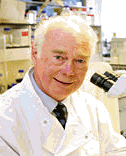|
News & Views item - December 2007 |
![]() 2007
Nobel Laureate Martin Evans Criticises the UK Government and Civil
Service for not Sufficiently Valuing Science. (December 19,
2007)
2007
Nobel Laureate Martin Evans Criticises the UK Government and Civil
Service for not Sufficiently Valuing Science. (December 19,
2007)
 Martin
Evans, Mario Capecchi and Oliver Smithies were awarded the 2007 Nobel
Prize in Medicine or Physiology for their development of knockout mice.
Such mice are designed to lack a specific gene or genes, thereby helping
researchers to determine the functions of the specific gene or gene
group. Professor Evans (66) is Professor of Mammalian Genetics and
Director of the School of Biosciences, Cardiff University.
Martin
Evans, Mario Capecchi and Oliver Smithies were awarded the 2007 Nobel
Prize in Medicine or Physiology for their development of knockout mice.
Such mice are designed to lack a specific gene or genes, thereby helping
researchers to determine the functions of the specific gene or gene
group. Professor Evans (66) is Professor of Mammalian Genetics and
Director of the School of Biosciences, Cardiff University.
Following the Prize giving ceremony in Stockholm on December 10, Professor Evans spoke at a conference in Kiruna, Sweden, held to celebrate the 300th anniversary of the birth of Carl Linnaeus, and following the conference he was interviewed by The Guardian's James Randerson.
Professor Evans tells his interviewer how he thinks the best and brightest could and should be enticed into a scientific career. He also made the point at the conference that: "Science has not been regarded with the same level of appreciation as things such as politics and economics as a basis of government and government service, and I think it should be equally important... Science should be part of the understanding, the education of any educated man or woman and also of anybody who really is going to make decisions. At the moment unfortunately it isn't."
And he is of the opinion that decision-makers needed a better understanding of the nature of scientific knowledge: "Science is not fixed, it is a matter of opinions based on evidence; politicians and ... journalists don't like it. They don't like having something that is not yes or no."
And the soft-spoken academic has decided views regarding homeopathy: "I have great problems with homeopathy, not because the people carrying it out and the practitioners aren't doing this for the best of aims, but because they are taking an idea, a philosophy and applying it in extremis, without being prepared to do an evidence basis."
Click here to listen to the 8-minute interview.